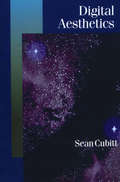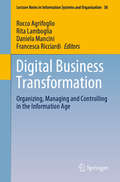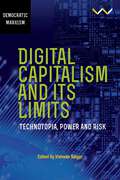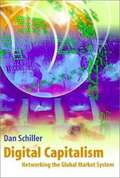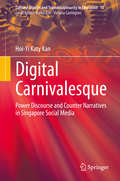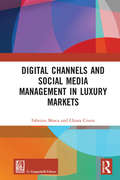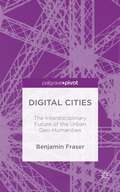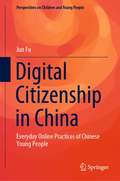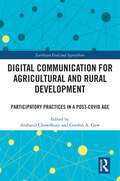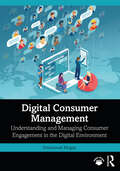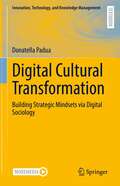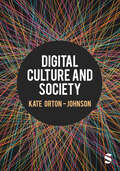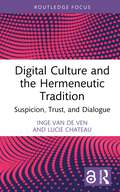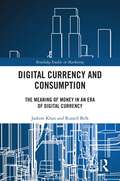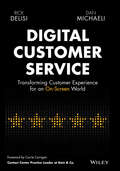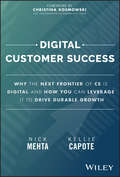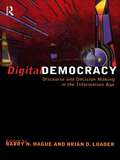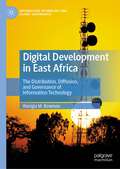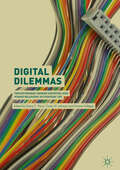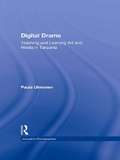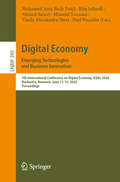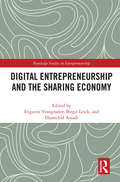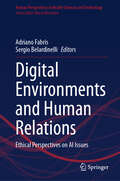- Table View
- List View
Digital Aesthetics (Published in association with Theory, Culture & Society)
by Sean CubittThis book investigates the aesthetic nature and purpose of computer culture in the contemporary world. It casts a cool eye on the claims of cybertopians, tracing the globalization of the new medium and enquiring into its effects on subjectivity and sociality. Drawing on historical scholarship, philosophical aesthetics, and the literature of cyberculture, the author argues for a genuine democracy beyond the limitations of the free market and the global corporation. Digital arts are identified as having a vital part to play in this process. Written in a balanced and penetrating style, the book both conveniently summarizes a huge literature and sets a new agenda for research and theory. Copyright © Libri GmbH. All rights reserved.
Digital Business Transformation: Organizing, Managing and Controlling in the Information Age (Lecture Notes in Information Systems and Organisation #38)
by Francesca Ricciardi Rocco Agrifoglio Daniela Mancini Rita LambogliaThe recent surge of interest in “digital transformation” is changing the business landscape and posing several challenges, both organizational and sectoral. This transformation involves the application of digital technology in all aspects of business, and enables organizations to create new products and services, and to find more efficient ways of doing business.Moreover, the digital transformation is happening within and across organizations of all types and in every industry, producing a disruptive innovation that can break down the barriers between people and organizations, and help create more adaptive processes. In the information age, it is imperative for organizations to develop IT-related capabilities that allow them to leverage the potential of digital technologies. Due to the pervasive effects of this transformation on processes, firms and industries, both scholars and practitioners are interested in better understanding the key mechanisms behind the emergence and evolution of the digital business transformation.This book presents a collection of research papers focusing on the relationships between technologies (e.g., digital platforms, AI, blockchain, etc.), processes (e.g., decision-making, co-creation, financial, compliance, etc.), and organizations (e.g., smart organizations, digital ecosystems, Industry 4.0, collaborative networked organizations, etc.), which have been categorized into three major areas: organizing, managing and controlling. It also provides critical insights into how the digital transformation is enhancing organizational processes and firms’ performance through an exploration and exploitation of internal resources, and through the establishment of external connections and linkages. The plurality of views offered makes this book particularly relevant for users, companies, scientists, and governments. The content of the book is based on a selection of the best papers (original double-blind peer-reviewed contributions) presented at the annual conference of the Italian chapter of the AIS, which was held in Naples, Italy in September 2019.
Digital Capitalism and its Limits: Technotopia, Power and Risk
by Vishwas SatgarThe Fourth Industrial Revolution (4IR) has been described as the next big leap in digital capitalism. Digital technologies such as artificial intelligence, quantum computing, 3D printing and robotisation, we are led to believe, will bring more progress, growth and development while also helping us to resolve the deep and multiple crises the world is in. Billions are being invested in these technologies, accompanied by sharp geopolitical rivalries to secure an edge in the control over them. Volume 8 in the Democratic Marxism series invites readers to think more deeply and critically about digital capitalism and its limits. While most governments in the world, including South Africa, have accepted a techno-nationalist narrative and have deliberated on the risks for the planet and humanity, the volume interrogates the effects and consequences of advances in artificial intelligence and heightened technological innovation and industrialisation on employment, democracy and the climate. Viewing the grand social engineering of 4IR through a Marxist lens, the volume contributors engage critically with the class project of digital monopoly capitalism and its powerful totalitarian tendencies. They question the dangerous technotopian imaginary shaping this digital techno-shift, the implications of algorithmic data extractivism, the securitisation of already weak market democracies, the social consequences of digital learning, lack of regulation, and the power dynamics in the labour process. Anchored in techno-realism, the interdisciplinary perspective captured in this volume puts forward alternatives for democratisation and a just transition to protect human and non-human life.
Digital Capitalism: Networking the Global Market System
by Dan SchillerCyberspace not only exemplifies but spearheads the greater political economy of which it has become such a critical part. The networks that comprise cyberspace were originally created at the behest of government agencies, military contractors, and allied educational institutions. However, over the past generation or so, a growing number of these networks began to serve primarily corporate users. Under the sway of an expansionary market logic, the Internet began a political-economic transition toward what Dan Schiller calls "digital capitalism." Schiller traces these metamorphoses through three critically important and interlinked realms. Parts I and II deal with the overwhelmingly "neoliberal" or market-driven policies that influence and govern the telecommunications system and their empowerment of transnational corporations while at the same time exacerbating exisiting social inequalities. Part III shows how cyberspace offers uniquely supple instruments with which to cultivate and deepen consumerism on a transnational scale, especially among privileged groups. Finally, Part IV shows how digital capitalism has already overtaken education, placing it at the mercy of a proprietary market logic.
Digital Carnivalesque: Power Discourse and Counter Narratives in Singapore Social Media (Cultural Studies and Transdisciplinarity in Education #10)
by Hoi-Yi Katy KanThis book challenges the framing of comedic acts as apolitical and it adopts a multimodal critical discourse approach to interrogate the performance of comedy as a form of power. It proposes using Bakhtin’s carnivalesque as the analytic tool to distil for readers key differences between humour as banal and humour as critical (and political) in today’s social media. Drawing from critical theory and cultural studies, this book takes an interdisciplinary approach in formulating a contemporary view of power that reflects social realities not only in the digital economy but also in a world that is increasingly authoritarian. With the proposition of newer theoretical lenses in this book, scholars and social scientists can then find a way to shift the conversation to uncover the evolving voices of (existing and newer) power holders in the shared digital space; and to view current social realities as a continual project in unpacking and understanding the adaptive ways of the human spirit.
Digital Channels and Social Media Management in Luxury Markets (Routledge-Giappichelli Studies in Business and Management)
by Fabrizio Mosca Chiara CiveraIn recent years, luxury goods markets have faced significant changes that have influenced both the dynamics of the competition, as well as their strategies. The principal changes include the following: new geographical market development, such as in the Far East, India, and some parts of Africa (these countries are added to a list of already relevant countries that are involved in luxury goods consumption, such as the Emirates, Russia, and South America); diffusion of new media and new technologies in communication, which is characterized by a high degree of interaction; the evolution of distribution channels is underway – these channels are moving towards new forms of integration that utilize both physical digital channels. This has forced firms to revise their strategies and implement multichannel marketing strategies to continue to operate in increasingly international markets that are characterized by increasingly more demanding and informed consumers. This book will enable readers to gain a clear insight into how the luxury goods market operates and amongst other things, focuses on: recent internet and social media strategies adopted by luxury companies and their brands; how luxury companies manage their communication and distribution channels to compete in the market and the impact of digital marketing on their competition; the main models of direct and indirect distribution in the digital channels; how consumers react to multichannel strategies; trends, social commerce and CSR and how luxury companies react; identifying the different social media strategies for luxury companies.
Digital China: Big Data and Government Managerial Decision
by Qing JiangThis book is the first practical case study on the application of big data in China's government management scenarios, which is important for comprehensively presenting the achievements of China's e-government and digital construction as well as deeply understanding the implementation of big data strategy in China.The author of this book is one of the earliest practitioners engaged in the study of big data applications, and has personally experienced the development, major events, application cases, and industry changes of big data in China. Cases in this book are all actual projects carried out. The author of this book explains the development history of big data she has personally experienced, presenting in an easy-to-understand way the basic concept and characteristics of big data and practical interpretation, which provides important reference for the practical work of government and enterprise managers. The application ideas of big data in management innovation are proposed, and scenarios are described and discussed in terms of accelerating research on sharing big data in government affairs, breaking barriers, realizing data flow information sharing, creating one-stop services, improving the corresponding policy system for sharing big data in government affairs, building public information platform for e-government, and strengthening network and information infrastructure.Especially for the government personnel in departments, this book will give them a better understanding of the charm and value of big data, intuitively understand the utilization and analysis of big data, carry out effective government management and make correct decisions, so as to improve the data literacy of organizations and individuals, form scientific support for their own government's decision-making and management, thus promote the continued construction of digital government, digital China, and digital economy era based on the application of big data.
Digital Cities: The Interdisciplinary Future of the Urban Geo-Humanities
by Benjamin FraserDigital Cities stakes claim to an interdisciplinary terrain where the humanities and social sciences combine with digital methods. Part I: Layers of the Interdisciplinary City converts a century of urban thinking into concise insights destined for digital application. Part II: Disciplinary/Digital Debates and the Urban Phenomenon delves into the bumpy history and uneven present landscape of interdisciplinary collaboration as they relate to digital urban projects. Part III: Toward a Theory of Digital Cities harnesses Henri Lefebvre's capacious urban thinking and articulation of urban 'levels' to showcase where 'deep maps' and 'thick mapping' might take us. Benjamin Fraser argues that while disciplinary frictions still condition the potential of digital projects, the nature of the urban phenomenon pushes us toward an interdisciplinary and digital future where the primacy of cities is assured.
Digital Citizenship in China: Everyday Online Practices of Chinese Young People (Perspectives on Children and Young People #12)
by Jun FuThis book examines how emerging forms of citizenship are shaped by young people in digital spaces as way of making sense of contemporary Chinese society, forming new identities, and negotiating social and political participation. By focusing on Chinese young adults' everyday online practices, the book offers a unique treatment of the topic of young people and the Chinese Internet that navigates between the dominant focus on censorship on the one hand and protest and politicized action on the other. The book brings the focus of research from highly visible or spectacular forms of collectivity, belonging, and identification exhibited in young people's online practices to young people's everyday social and cultural engagement through new media. It brings new insights by understanding the meanings of young people's mundane and everyday online engagement for their citizenship learning, identity performance, and their formation of political subjectivity. Readers will gain insights into citizenship in China, and young people and the Chinese Internet.
Digital Communication for Agricultural and Rural Development: Participatory Practices in a Post-COVID Age (Earthscan Food and Agriculture)
by Gordon A. GowThis volume presents insights on the challenges of digital communication and participation in agricultural and rural development. The COVID-19 pandemic has revealed that digital technology and mediated participation is more important and essential in managing ongoing communication for development projects than ever before. However, it has also underscored the various challenges and gaps in knowledge with digital participatory practices, including the further exclusion of marginalized groups and those with limited access to digital technology. The book considers how the concept of participation has been transformed by the realities of the pandemic, reflecting on essential principles and practical considerations of communication for development and social change, particularly in the context of global agriculture and food security, the well-being of rural communities, and evolving environmental challenges, such as climate change. In gathering these insights, this volume highlights lessons for the future of participatory development in communication for development and social change processes. This volume will be of great interest to students and scholars of agricultural and rural development, communication for development, digital communication, and sustainable development more broadly.
Digital Consumer Management: Understanding and Managing Consumer Engagement in the Digital Environment
by Emmanuel MogajiIntegrating consumer behaviour, digital marketing, digital platform management, web analytics, and marketing insights, Digital Consumer Management provides a holistic understanding—from a brand perspective—of the management of consumers and consumption in the digital ecosystem. Chapters explore the key stakeholders in platform management, the multiple types of platforms used by brands, the various consumer-brand touchpoints, how the platforms are developed and with what goals in mind, managing consumer engagement and activities on these platforms, how the platforms are regulated, and the dark side of digital consumption. Theory is brought to life by practical examples and case studies from across sectors, and reflective questions and activities allow students to critically reflect on their learning. Providing a comprehensive picture of digital consumption activities, digital consumer behaviour across platforms, and how brands can manage and engage with the digital consumer, this text works as core and recommended reading for students studying digital consumer behaviour, digital marketing, and marketing management. Accompanying online resources include PowerPoint slides and an instructor’s manual.
Digital Cultural Transformation: Building Strategic Mindsets via Digital Sociology (Innovation, Technology, and Knowledge Management)
by Donatella PaduaThe hypercomplex digital-technological environment is exponential and revolutionary. Our social mindset adaptation, instead, is slower and evolutionary, as an individual’s or an organization culture needs time to transform. This book offers students, institutions, and organisations innovative and interdisciplinary digital sociology tools to help build an adaptive, flexible, imaginative social mindset in order to cope with such a gap and to match a sustainable digital transformation (DT). By disrupting traditional linear approaches to understand the context into which business models are designed, institutions and students are challenged with innovative transdisciplinary holistic models grounded into business case studies. If the book stimulates students to learn how purposefully and autonomously to explore the web, to grasp the deeper meaning of DT and its social impact, institutions are solicited to answer to direct quests that go right to the core of their transformative DNA as: ‘How effectively are you carrying on DT in a sustainable, people-centred way? Which is your socio-cultural DT profile and what are your DT areas of strength and areas of improvement?'In this frame of work, the innovative Four Paradigm Model indicates new coordinates and provides original tools to profile an institution’s digital transformation strategy, to analyse it, and measure the level of sustainable socio-economic value. Sample syllabi, PowerPoint slides and quizzes are available online to assist in the teaching experience.
Digital Culture and Society
by Kate Orton-JohnsonThis book provides a critical introduction to the ways in which digital technologies have enabled new types of interactions, experiences and collaborations across a range of platforms and media, profoundly shaping our socio-cultural landscapes. These discussions are grounded in classical sociological concepts; community, the self, gender, consumption, power and exclusion and inequality, to demonstrate the continuities that exist between sociological studies of ‘real’ world phenomena and their digital counterparts. Examining the various debates around methods in digital sociology in recent years, this book provides an accessible and engaging guide to using methodologies to study digital technology. From the moment we wake up until we go to bed, many of us constantly use digital technologies. Our mobile phones have become our maps, banks, newspapers and entertainment consoles. What′s more, they allow us to be constantly connected with the people in our lives. This book will equip you to analyse digital media in your own work. The book offers a broad guide to the various areas of our lives that are impacted by digital technology, from the virtual communities that we form on social media to the impact that digital technology has on our identity through a ′sociology of selfies′. With chapters on leisure, work, privacy and methods, this is an essential introduction for students in the areas of sociology, digital media, and cultural studies. Learning features include: - Annotated further reading in every chapter - Case studies that illustrate theory - Learning objectives and questions throughout - Historical and theoretical context in every chapter
Digital Culture and Society
by Kate Orton-JohnsonThis book provides a critical introduction to the ways in which digital technologies have enabled new types of interactions, experiences and collaborations across a range of platforms and media, profoundly shaping our socio-cultural landscapes. These discussions are grounded in classical sociological concepts; community, the self, gender, consumption, power and exclusion and inequality, to demonstrate the continuities that exist between sociological studies of ‘real’ world phenomena and their digital counterparts. Examining the various debates around methods in digital sociology in recent years, this book provides an accessible and engaging guide to using methodologies to study digital technology. From the moment we wake up until we go to bed, many of us constantly use digital technologies. Our mobile phones have become our maps, banks, newspapers and entertainment consoles. What′s more, they allow us to be constantly connected with the people in our lives. This book will equip you to analyse digital media in your own work. The book offers a broad guide to the various areas of our lives that are impacted by digital technology, from the virtual communities that we form on social media to the impact that digital technology has on our identity through a ′sociology of selfies′. With chapters on leisure, work, privacy and methods, this is an essential introduction for students in the areas of sociology, digital media, and cultural studies. Learning features include: - Annotated further reading in every chapter - Case studies that illustrate theory - Learning objectives and questions throughout - Historical and theoretical context in every chapter
Digital Culture and the Hermeneutic Tradition: Suspicion, Trust, and Dialogue (Routledge Focus on Literature)
by Inge van de Ven Lucie ChateauIn our information age, deciding what sources and voices to trust is a pressing matter. There seems to be a surplus of both trust and distrust in and on platforms, both of which often amount to having your mindset remain the same. Can we move beyond this dichotomy toward new forms of intersubjective dialogue? This book revaluates the hermeneutic tradition for the digital context. Today, hermeneutics has migrated from a range of academic approaches into a plethora of practices in digital culture at large. We propose a ‘scaled reading’ of such practices: a reconfiguration of the hermeneutic circle, using different tools and techniques of reading. We demonstrate our digital-hermeneutic approach through case studies including toxic depression memes, the Johnny Depp/Amber Heard trial, and r/changemyview. We cover three dimensions of hermeneutic practice: suspicion, trust, and dialogue. This book is essential reading for (under)graduate students in digital humanities and literary studies.
Digital Currency and Consumption: The Meaning of Money in an Era of Digital Currency (Routledge Studies in Marketing)
by Jashim Khan Russell BelkThe digitalization of payment modes, combined with the development of Blockchain technology, is shaping the future of digital currency worldwide. Many financial regulators are experimenting with the feasibility of digital currencies nationally in a variety of forms, such as cryptocurrency, virtual currency and central bank digital currency. These digital currencies are just some of those discussed in this book. Each facilitates a transaction efficiently and will likely open an alternative payment system, possibly leading to a global digital currency.This book will present and highlight a broad view of digital currency in the era of globalization. This book will address the meaning of money in a global world. By going beyond fungible national fiat-based currencies to global cryptocurrency and stablecoins, virtual currencies promise to disintermediate and decentralize money. The digital currencies that are the focus of this book use the internet for transactions and harbor the potential to make a unified digital currency system across the globe. This book explores the role of digital currency in influencing consumer behavior, from spending or saving to gaming, tipping and gambling. It asks what is the future of digital currency and what is its role in facilitating and transforming the future of the metaverse?Digital Currency and Consumption will be useful reading for a postgraduate audience to understand how digital currencies are shaping the digitalization of transactions and behavior of consumer citizens. It will be of value to researchers interested in a wide variety of disciplines, including international business, finance and consumer behavior.
Digital Customer Service: Transforming Customer Experience for an On-Screen World
by Rick DeLisi Dan MichaeliDigital Customer Service is the new standard for creating a 5-star customer experience As much as technology has improved our lives, for many people customer service experiences remain unnecessarily frustrating. But the advent of Digital Customer Service (DCS) promises to make these interactions seamless and effortless by creating experiences that occur entirely on a customer's own screen, even in situations where it is preferable to speak to an agent. Digital Customer Service: Transforming Customer Experience for an On-Screen World traces the evolution of customer service—as well as the evolution of customer expectations and the underlying psychology that drives customer behavior - from the days of the first call centers in the 1980s all the way to today's digital world. Written for Customer Service and Customer Experience leaders as well as C-suite executives (CEOs, CFOs, CIOs), Digital Customer Service helps business leaders balance three critical priorities: Creating an excellent experience for customers that increases customer loyalty and profitability Driving down the cost of Customer Service/Support interactions, while increasing revenue through Sales interactions Moving quickly toward the goal of "digital transformation" We have discovered—in our research and our first-hand experience—that when companies commit to achieving true Digital Customer Service, they can make significant progress toward all three of these goals at once. Digital Customer Service provides the roadmap for how your company can get there. And when you do, who wins? EVERYONE.
Digital Customer Success: Why the Next Frontier of CS is Digital and How You Can Leverage it to Drive Durable Growth
by Nick Mehta Kellie CapoteAutomate your Customer Success efforts to reduce churn and increase profits In Digital Customer Success: The Next Frontier, a team of trailblazing Customer Success professionals and digital entrepreneurs delivers an insightful discussion of the next stage in Customer Success management. In the book, you'll discover how to design and deploy touchless and automated digital interventions that help your software users learn and grow as they use your product and unlock the value trapped within it — without ever needing to reach out to a live Customer Success Manager. The authors provide a detailed “How-To” guide to Digital Customer Success that explains how you can meet the needs of your customers, investors, and team members. You'll explore the basics of the authors' original Digital Customer Success Maturity Model and the core tenets of how to get started. After that, you'll find: Explanations of the ideal organizational structures to enable Digital Customer Success management Case studies and examples from real companies blazing new trails in Customer Success Critical success measurements and metrics you can use to determine if your company is on the right track or if it needs to reorient Perfect for managers, executives, directors, founders, entrepreneurs, and other business leaders involved in the sale of digital and software products, Digital Customer Success is also a can't-miss resource for Customer Success professionals, sales leaders, marketers, product development professionals, and anyone else with a stake in reducing customer churn and increasing revenues.
Digital Democracy: Discourse and Decision Making in the Information Age
by Brian D. Loader Barry N. HagueDigital Democracy considers how technological developments might combine with underlying social, economic and political conditions to produce new vehicles for democratic practice.The growth of new Information and Communication Technologies (ICTs) such as the Internet, alongside growing concerns about the failure of advanced societies to live up to the democratic idea, has produced much interest in the prospects for a digital democracy.This book will provide invaluable reading for those studying social policy, politics and sociology as well as for policy analysts, social scientists and computer scientists.
Digital Development in East Africa: The Distribution, Diffusion, and Governance of Information Technology (Information Technology and Global Governance)
by Warigia M. BowmanThis book uses comparative case study methodology and extensive field work to examine and compare outcomes of four East African nations (Kenya, Tanzania, Uganda, and Rwanda) that implemented formal Information and Communications Technology policies in the 1990s. Based on extensive fieldwork, the book assesses the emergence of a new policy and technological arena from the turn of the millennium to the present. In addition to tracing the implementation and reception of these policies, Bowman considers to what extent the politics of infrastructure in four connected but distinct African nations have resulted in global participation and equitable distribution and access of infrastructure to all citizens, as well as the impact a recent history of war or peace have on the technological outcomes in these communities. The book provides us with invaluable new data on how policy and politics function in emerging democracies, and illuminates long-overlooked opportunities and conditions necessary for the distribution of new and potentially beneficial technologies in other developing countries.
Digital Dilemmas: Transforming Gender Identities and Power Relations in Everyday Life
by Simone Fullagar Diana C. Parry Corey W. JohnsonThe proliferation of digital technologies, virtual spaces, and new forms of engagement raise key questions about the changing nature of gender relations and identities within democratic societies. This book offers a unique collection of chapters that brings together scholars from diverse backgrounds to explore how gender experiences and identities are being transformed by digital technologies in ways that affirm or deny social justice.
Digital Drama: Teaching and Learning Art and Media in Tanzania
by Paula UimonenThe aim of this book is to explore digital media and intercultural interaction at an arts college in Tanzania, through innovative forms of ethnographic representation. The book and the series website weave together visual and aural narratives, interviews and observations, life stories and video documentaries, art performances and productions. It paints a vivid portrayal of everyday life in East Africa’s only institute for practical art training, while tracing the rich cultural history of a state that has mixed tribalism, nationalism, Pan-Africanism, and cosmopolitanism in astonishingly creative ways. While following the anthropological tradition of thick description, Digital Drama employs a more artistic and accessible style of writing. Dramatic, ethnographic details are interspersed with theoretical reflections and postulations to explain and make sense of the unfolding narratives. The accompanying website visualizes and sensualizes the stories narrated in the book, unfolding a dramatic world of African dance, music, theater, and digital culture.
Digital Economy. Emerging Technologies and Business Innovation: 5th International Conference on Digital Economy, ICDEc 2020, Bucharest, Romania, June 11–13, 2020, Proceedings (Lecture Notes in Business Information Processing #395)
by Rim Jallouli Mohamed Anis Bach Tobji Ahmed Samet Mourad Touzani Vasile Alecsandru Strat Paul PocatiluThis book constitutes the refereed proceedings of the 5th International Conference, ICDEc 2020, held in Bucharest, Romania, in June 2020. Due to the COVID-19 pandemic the conference took place virtually. The 13 full papers presented in this volume together with 3 abstracts of keynotes and 1 introductory paper by the steering committee were carefully reviewed and selected from a total of 41 submissions. The core theme of this year’s conference was “Emerging Technologies & Business Innovation”. The papers were organized in four topical sections named: digital transformation, data analytics, digital marketing, and digital business models.
Digital Entrepreneurship and the Sharing Economy (Routledge Studies in Entrepreneurship)
by Evgueni VinogradovThe digital and increasingly digitised world is shaped by the interplay of new technological opportunities and ubiquitous societal trends. Both lead to drastic changes facing artificial intelligence (AI), cryptocurrencies and block-chain technologies, internet of things, technology-based surveillance, and other disruptive innovations. These developments facilitate the rise of the sharing economy and open for a variety of new entrepreneurial opportunities that businesses can take up. The novel entrepreneurial opportunities, however, imply a paradigmatic shift in the understanding of entrepreneurship. This book combines digital entrepreneurship with the sharing economy. It presents cutting-edge research for scholars and practitioners interested in either one of the topics – digital entrepreneurship or sharing economy – or their connection. The book addresses three major ways to become entrepreneurial in the sharing economy: digital entrepreneurship through creating novel sharing-economy platforms; technology entrepreneurship through the exploitation of sharing-economy platforms; and business model innovation or business model change influenced by the sharing economy. The book also highlights governance questions on digital entrepreneurship in the sharing economy, which are highly relevant for businesses, the economy, and society. The book will be of interested to researchers, academics, and students in the field of business and entrepreneurship, with a special focus on digital entrepreneurship.
Digital Environments and Human Relations: Ethical Perspectives on AI Issues (Human Perspectives in Health Sciences and Technology #150)
by Adriano Fabris Sergio BelardinelliIn Digital Environments and Human Ecology: New Perspectives on AI Issues, editors and contributors embark on a multidisciplinary exploration of how artificial intelligence (AI) is reshaping the landscapes of human interactions, societal structures, and individual and collective psychologies. Discussing if and to what extent the digital environment can be considered an extension of our environment, this book investigates the profound implications of AI's integration into our daily life, emphasizing the need for a harmonious coexistence between technological advancements and human-centric values, stressing the importance of sustainability in digital development and, therefore, a renewed Human Ecology. By weaving together insights from computer science, social sciences, philosophy, and environmental studies, this book offers a comprehensive and nuanced understanding of the complex relationship between humans and technology. It serves as a vital resource for policymakers, technologists, scholars, and anyone interested in the ethical and ecological implications of digital technologies in our lives.
